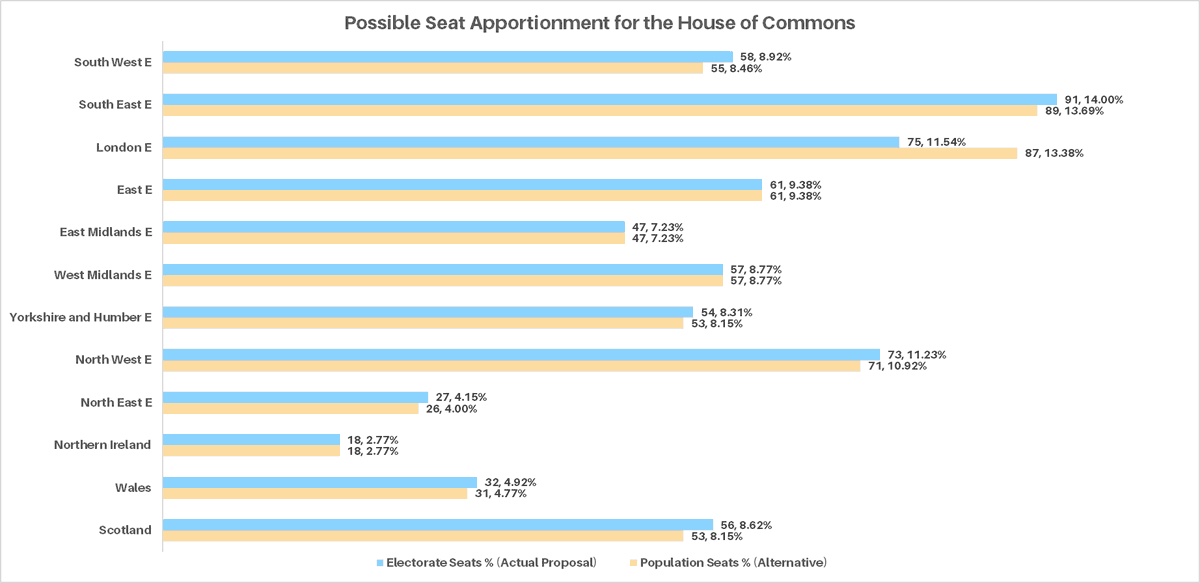Time for a topical BBS THREAD (an exciting one on boundaries):
Proposed Commons seat numbers (but not yet boundaries) for each region/nation of the UK in the upcoming boundary review are now out. Scotland down 2 to 57.
This has caused a bit of upset, but for the wrong reasons! https://twitter.com/ElectionMapsUK/status/1346414066030534659
Proposed Commons seat numbers (but not yet boundaries) for each region/nation of the UK in the upcoming boundary review are now out. Scotland down 2 to 57.
This has caused a bit of upset, but for the wrong reasons! https://twitter.com/ElectionMapsUK/status/1346414066030534659
Electoral apportionment (for lower chambers) in most democracies is in some way linked to population.
The simple reality is that the population of the south of the UK is increasing faster than it is in the north, so seat rebalancing is natural. It's not an evil ploy by anyone!
The simple reality is that the population of the south of the UK is increasing faster than it is in the north, so seat rebalancing is natural. It's not an evil ploy by anyone!
However, rather than pure population (which is how e.g. the US does it), the UK uses registered voters (electorate). This may seem fair at first glance, but remember that MPs represent everyone in their constituency, not just those registered to vote.
Doing it this way does therefore tip the general balance of seats slightly more towards rural than urban areas, because the people least likely to be registered (or eligible) to vote, such as the young, poor, ethnic minorities and migrants are more likely to live in cities.
Believe it or not though, given all regions and nations (with one very notable exception) are a mix of urban and rural areas, most of the impact of this is probably WITHIN rather than BETWEEN regions, e.g. Citychester may end up with fewer MPs/person than Citychestershire.
The notable exception is London, which is pure city. And for folk who were grumpy about the rebalancing towards the south of England, I have further bad news - it's actually the case that basically everywhere else gains at London's expense versus pure population apportionment!
If we apportioned seats purely by population, London would have a whopping 12 MPs more than proposed - obviously as both UK's capital and a major global centre, London has a v large population of people not presently eligible to vote. Everywhere else has same or more as a result.
Given that people are affected by the decisions of the governments where they live regardless of whether they are eligible or registered to vote, I'd argue we should both be apportioning by population and extending franchise to all aged 16+ (as Scotland has for all but UK elecs)
All of that said, as ever the main reason to be mad about boundary changes is not the shuffling of seats between areas, but the fact our ghastly electoral system necessitates boundary reviews in this form, which have such potentially massive impact on the result of the election.
It shouldn't be the case that drawing lines differently can make the same votes result in dozens of different outcomes. It shouldn't be the case that people in two towns find themselves as one "local" area at one election, then changes put them in different areas at the next.
Dramatic and contentious boundary changes are just another one of the many flaws of First Past the Post, an electoral system we should have left in the 19th century. Of course, we're currently stuck with it, but we really shouldn't be.
Solid forms of PR - which, sorry STV fans, doesn't include STV as it also needs regular & substantial boundary changes - both more fairly represent the actual views of voters and ensure consistency of geographic representation by changing seat numbers, not boundaries.
END THREAD
END THREAD

 Read on Twitter
Read on Twitter


